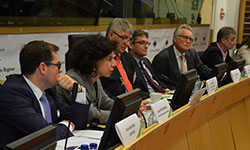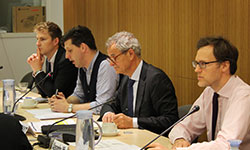BusinessEurope Headlines No. 2016-23
Effective scrutiny of draft impact assessments is crucial for better regulation
 Scrutiny is a crucial part of the European Commission’s impact assessment system to ensure that the Commission’s impact assessment and consultation guidelines are being properly followed, BusinessEurope Director General Markus J. Beyrer told the Chair of the Regulatory Scrutiny Board, Anne Bucher, on 20 June. BusinessEurope greatly supports the Commission’s impact assessment system and is confident that the central quality control and support for Commission impact assessment and evaluation work provided by the Regulatory Scrutiny Board will lead to better regulation in the EU. The Board should ensure that innovation is properly taken into account in developing new legislation and give stakeholders the opportunity to address shortcomings of an impact assessment directly to it before the proposal and the assessment are finalised.
Scrutiny is a crucial part of the European Commission’s impact assessment system to ensure that the Commission’s impact assessment and consultation guidelines are being properly followed, BusinessEurope Director General Markus J. Beyrer told the Chair of the Regulatory Scrutiny Board, Anne Bucher, on 20 June. BusinessEurope greatly supports the Commission’s impact assessment system and is confident that the central quality control and support for Commission impact assessment and evaluation work provided by the Regulatory Scrutiny Board will lead to better regulation in the EU. The Board should ensure that innovation is properly taken into account in developing new legislation and give stakeholders the opportunity to address shortcomings of an impact assessment directly to it before the proposal and the assessment are finalised.
Read more or contact: Erik Berggren
Discussing TTIP at the EESC and the Walloon Parliament
 A dedicated energy chapter in the Transatlantic Trade and Investment Partnership is important from an economic and strategic point of view. EU companies not only depend on open raw material and energy markets to be able to source at competitive prices, but access to secure, reliable and competitive energy sources is also in Europe’s strategic interest. This was part of BusinessEurope's message at the European Economic and Social Committee on 21 June, when we also highlighted the importance of setting a good precedent for future trade partners having a similar interest in energy-related issues and of promoting specific energy rules that could be taken up at plurilateral/multilateral level. In a debate at the Walloon Parliament on 23 June, BusinessEurope defended the benefits of a comprehensive and ambitious TTIP as a way of creating new opportunities for companies but also for workers and consumers that can all benefit from a more open, predictable and transparent transatlantic market.
A dedicated energy chapter in the Transatlantic Trade and Investment Partnership is important from an economic and strategic point of view. EU companies not only depend on open raw material and energy markets to be able to source at competitive prices, but access to secure, reliable and competitive energy sources is also in Europe’s strategic interest. This was part of BusinessEurope's message at the European Economic and Social Committee on 21 June, when we also highlighted the importance of setting a good precedent for future trade partners having a similar interest in energy-related issues and of promoting specific energy rules that could be taken up at plurilateral/multilateral level. In a debate at the Walloon Parliament on 23 June, BusinessEurope defended the benefits of a comprehensive and ambitious TTIP as a way of creating new opportunities for companies but also for workers and consumers that can all benefit from a more open, predictable and transparent transatlantic market.
Contact: Luisa Santos
For a more efficient waste management system in Europe
 The legislative proposals on waste and landfill of waste are positive steps in the right direction, according to BusinessEurope. However, some parts of the proposals need to be improved to avoid unintended consequences and to develop smarter regulation helping to move the agenda up. In our latest position paper on the topic, we make a number of concrete proposals on how these pieces of legislation should be amended, for instance by adjusting definitions, ensuring targets are based on harmonised rules for calculating progress, or guaranteeing minimum requirements for extended producer responsibility schemes.
The legislative proposals on waste and landfill of waste are positive steps in the right direction, according to BusinessEurope. However, some parts of the proposals need to be improved to avoid unintended consequences and to develop smarter regulation helping to move the agenda up. In our latest position paper on the topic, we make a number of concrete proposals on how these pieces of legislation should be amended, for instance by adjusting definitions, ensuring targets are based on harmonised rules for calculating progress, or guaranteeing minimum requirements for extended producer responsibility schemes.
Read more or contact: Valentina Spina
EU and China to address e-commerce challenges together
 Developing a suitable framework for e-commerce requires a global vision. The issues of trust, simple and transparent rules, enforcement and legal certainty are common barriers for e-commerce businesses, whether they are operate from the EU or from China. International cooperation and experience sharing are therefore essential when addressing these barriers. These messages were delivered by Pedro Oliveira, Senior Adviser at BusinessEurope, during the 1st EU-China legal affairs dialogue on 20 and 21 June in Beijing.
Developing a suitable framework for e-commerce requires a global vision. The issues of trust, simple and transparent rules, enforcement and legal certainty are common barriers for e-commerce businesses, whether they are operate from the EU or from China. International cooperation and experience sharing are therefore essential when addressing these barriers. These messages were delivered by Pedro Oliveira, Senior Adviser at BusinessEurope, during the 1st EU-China legal affairs dialogue on 20 and 21 June in Beijing.
Contact: Pedro Oliveira
Sufficient investment in core transport infrastructure is a must for the EU economy
 Investment in innovative solutions and strategic projects along core trans-European transport infrastructure should be increased, for instance by triggering more private investment through the Connecting Europe facility and the European Fund for Strategic Investment (EFSI). The cost of EU infrastructure development to match the expected heavy increase in demand for transport has been estimated at over 1 trillion euros between now and 2030. This was stressed by Alberto Mazzola, Vice-Chair of BusinessEurope’s Transport Working Group, at the TEN-T Days 2016 on 21 June in Rotterdam. At the same time transport in Europe must become more sustainable without compromising mobility. EU funds should be targeted at projects with significant European added value, such as strategic cross-border projects that would otherwise not be realised. Ensuring strong public commitment in infrastructure investment, including sufficient funding at both EU and national level, is crucial for Europe to become more competitive. The review of the multi-annual financial framework later this year is an opportunity to rethink and refocus Europe’s investment strategy for transport.
Investment in innovative solutions and strategic projects along core trans-European transport infrastructure should be increased, for instance by triggering more private investment through the Connecting Europe facility and the European Fund for Strategic Investment (EFSI). The cost of EU infrastructure development to match the expected heavy increase in demand for transport has been estimated at over 1 trillion euros between now and 2030. This was stressed by Alberto Mazzola, Vice-Chair of BusinessEurope’s Transport Working Group, at the TEN-T Days 2016 on 21 June in Rotterdam. At the same time transport in Europe must become more sustainable without compromising mobility. EU funds should be targeted at projects with significant European added value, such as strategic cross-border projects that would otherwise not be realised. Ensuring strong public commitment in infrastructure investment, including sufficient funding at both EU and national level, is crucial for Europe to become more competitive. The review of the multi-annual financial framework later this year is an opportunity to rethink and refocus Europe’s investment strategy for transport.
Read more or contact: Jeroen Hardenbol
Enhanced and more central role of innovation in regulatory system will benefit all
 Proper integration of innovation in the better regulation agenda seems to be one of the top priorities for the industry as well as other stakeholders, including EU institutions. This was one of the key conclusions of the first official meeting organised by the Slovak Presidency of the Council of the European Union. Experts on better regulation and innovation met in Bratislava on 14-15 June to discuss a range of issues linked to policy-making. At the meeting, BusinessEurope’s Adviser Jan Bambas outlined recent inputs from the business community and examples of how the Innovation Principle and an innovation-friendly regulatory framework could contribute to competitiveness and address societal challenges in Europe. He presented good and bad practices demonstrating how regulation affects innovation. Such a collection of examples could be a source of evidence for the upcoming presidency and future work on the right criteria and definitions. Participants also discussed the role of innovation deals and the Innovation Principle in policy-making.
Proper integration of innovation in the better regulation agenda seems to be one of the top priorities for the industry as well as other stakeholders, including EU institutions. This was one of the key conclusions of the first official meeting organised by the Slovak Presidency of the Council of the European Union. Experts on better regulation and innovation met in Bratislava on 14-15 June to discuss a range of issues linked to policy-making. At the meeting, BusinessEurope’s Adviser Jan Bambas outlined recent inputs from the business community and examples of how the Innovation Principle and an innovation-friendly regulatory framework could contribute to competitiveness and address societal challenges in Europe. He presented good and bad practices demonstrating how regulation affects innovation. Such a collection of examples could be a source of evidence for the upcoming presidency and future work on the right criteria and definitions. Participants also discussed the role of innovation deals and the Innovation Principle in policy-making.
Contact: Jan Bambas
Towards a balanced EU approach to insolvency
 BusinessEurope is generally supportive of a second-chance approach in the European Union. Insolvencies affect 200,000 companies a year in the EU and a quarter of these have an impact on the internal market. It is however essential that EU intervention is balanced against the interests of creditors. Also, because of how insolvency rules are deeply linked to national legal traditions, we would prefer a targeted approach with a focus on restructuring and recovery.
BusinessEurope is generally supportive of a second-chance approach in the European Union. Insolvencies affect 200,000 companies a year in the EU and a quarter of these have an impact on the internal market. It is however essential that EU intervention is balanced against the interests of creditors. Also, because of how insolvency rules are deeply linked to national legal traditions, we would prefer a targeted approach with a focus on restructuring and recovery.
Read more or contact: Pedro Oliveira
Debating the reform of the EU emission trading scheme
 "The EU ETS reform needs to be a success for all covered sectors. Therefore the split between auctioned and free allowances must be reviewed to guarantee that the best performing plants continue to receive 100% free allowances after 2020." This was stressed by Olivier Imbault, Chair of BusinessEurope’s Energy and Climate Working Group, in an exchange of views with MEP Ian Duncan on 16 June. The rapporteur at the European Parliament Environment Committee outlined his draft opinion, stressing that it is based on what he believes could be achieved within the European Parliament. "The views of industry are invaluable to hear, I was glad to attend the debate and look forward to further engagement with BusinessEurope members", Duncan said. The importance of achieving realistic benchmarks, concerns about a tiered approach and the need for compensation of indirect costs were also discussed.
"The EU ETS reform needs to be a success for all covered sectors. Therefore the split between auctioned and free allowances must be reviewed to guarantee that the best performing plants continue to receive 100% free allowances after 2020." This was stressed by Olivier Imbault, Chair of BusinessEurope’s Energy and Climate Working Group, in an exchange of views with MEP Ian Duncan on 16 June. The rapporteur at the European Parliament Environment Committee outlined his draft opinion, stressing that it is based on what he believes could be achieved within the European Parliament. "The views of industry are invaluable to hear, I was glad to attend the debate and look forward to further engagement with BusinessEurope members", Duncan said. The importance of achieving realistic benchmarks, concerns about a tiered approach and the need for compensation of indirect costs were also discussed.
Contact: Leon de Graaf
Tax policy group discuss state aid regulations
 Following a number of high-profile European Commission cases against member states relating to the corporate tax treatment of specific companies, BusinessEurope Tax Policy group were pleased to welcome from the Commission, Max Lienemeyer, Head of Sector in DG Competition’s Tax Force on Tax Planning Practices, at its meeting on 15 June. Mr Lienemeyer gave members an explanation of the Commission’s recently published guidelines in this area as well as answering questions. Such guidelines can play an important role in reducing uncertainty regarding the Commission action as it undertakes its work to enforce state aid regulations.
Following a number of high-profile European Commission cases against member states relating to the corporate tax treatment of specific companies, BusinessEurope Tax Policy group were pleased to welcome from the Commission, Max Lienemeyer, Head of Sector in DG Competition’s Tax Force on Tax Planning Practices, at its meeting on 15 June. Mr Lienemeyer gave members an explanation of the Commission’s recently published guidelines in this area as well as answering questions. Such guidelines can play an important role in reducing uncertainty regarding the Commission action as it undertakes its work to enforce state aid regulations.
Contact: James Watson
Calendar

- 26 June 2016: Spanish general election
- 28-29 June 2016: European Council meeting, Brussels
- 30 June 2016: EESC position on specific key issues of the TTIP negotiations - Public hearing, Brussels
- 1 July 2016: Slovak Presidency of the European Union starts